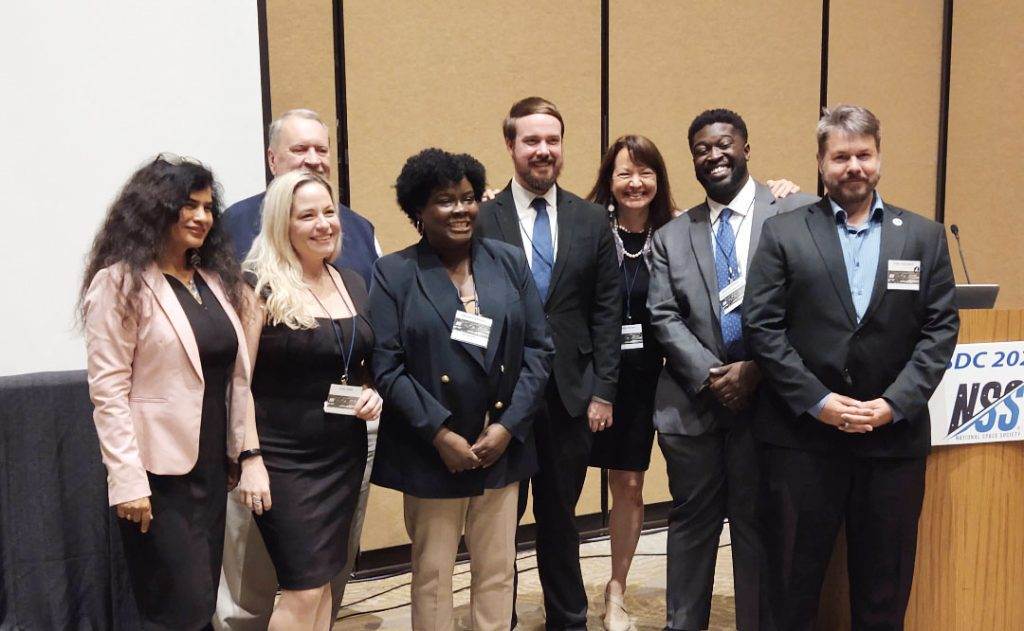Wide-Ranging Presentations Highlight the Complexities Facing Private and National Space Actors
Image: Space policy panel participants (L to R), Namrata Goswami, Leah Cheli, Ed Koeliner, Alexandra Dolce, Ian Perry, Michelle Hanlon (track chair), Kwame Newton, Peter Garrestson. Not included: Greg Autry.
At the 41st annual International Space Development Conference® (ISDC®) held in Frisco, Texas a little over a week ago, the National Space Society (NSS) hosted an incisive collection of talks on space policy and its ramifications for the settlement of space in the 21st century. The sessions were chaired by Michelle Hanlon of For All Moonkind and Co-Director of the Air and Space Law Program at the University of Mississippi School of Law and its Center for Air and Space Law. Hanlon served as the President of NSS from 2021 through early 2023 and remains a member of the Board of Directors.
“Policy decisions drive agendas and help move the needle forward,” said Karlton Johnson, Chairman of the NSS Board of Governors. “The ISDC 2023 policy track has positioned NSS to take the high ground in the ‘space for all’ conversation. Many thanks to the remarkable team that shepherded this track, and to NSS leadership for their focus on advancing space settlement another step forward.”
Among the notable speakers were:
- Kwame Newton, a Senior Analyst at Renaissance Strategic Advisors, who addressed the topic of space resources and their ongoing availability to all;
- Leah Cheli of the University of Mississippi Center for Air & Space Law on regulation of newspace activities;
- Namrata Goswami of Arizona State University on what different nationalities and actors choose to prioritize in space development;
- Peter Garretson of the American Foreign Policy Council on progress in U.S. space policy;
- Dr. Greg Autry of the Thunderbird School of Global Management at ASU on how lawyers, MBAs and “policy wonks” will determine our future in space;
- Alexandra Dolce, a Fellow of For All Moonkind’s Institute on Space Law and Ethics and who serves on the NSS Roadmap to Space Settlement Committee, on the need for a specialized “space court” to address legal concerns off-Earth.
- Ian Perry who attended in his personal capacity to discuss liability for accidents in space.
Hanlon noted, “My goal in curating the policy track at this year’s ISDC was to encourage discussion about the role of law and policy with regard to societies beyond Earth,” said Hanlon. “The audience was quite engaged and we opened up the proceedings to their terrific questions and comments—it was a truly wholistic discussion!”
Dale Skran, COO of the National Space Society, noted, “Among many noteworthy presentations on policy and legal issues in the new space age, Leah Cheli made an excellent case for the Federal Communications Commission and the Department of Commerce having the lead role in regulating new activities in space, and Alexandra Dolce presented a timely and carefully crafted proposal for an international space court. One of the purposes of the ISDC is to provide a platform for ideas like these.”




















1 thought on “NSS Hosts Robust Discussion of Space Policy”
In reading all this my first thoughts are once people are settled on Mars and independent of Earth, then it will not matter what you attempt to set in place with laws, courts, guidelines, policies and on like that. They are going to want, I think, to govern themselves, so unless people on Earth at that future time want to go to war with who now are the Martians, then best to set up other ideas that support not control what life will be like for everyone and even now support ideas that allow for their independence, instead of attempting to control the settlers of Mar and the Moon. Like create community Mars and Moon farms where people can learn how to successfully as independent people’s to live on the Moon and on Mars and how to handle conditions that can come up. I am confused as to why anyone thinks that after the future Martians and those on the Moon are able to be independent of Earth that they will want people on Earth controlling them as well as will want to live as people on Earth live. Instead why not focus on how to create future friendships and bonds with the Martians and those on the Moon or any other place off of Earth. Anyway, just giving some thoughts to think on based on my understanding of Earth’s historical past events.